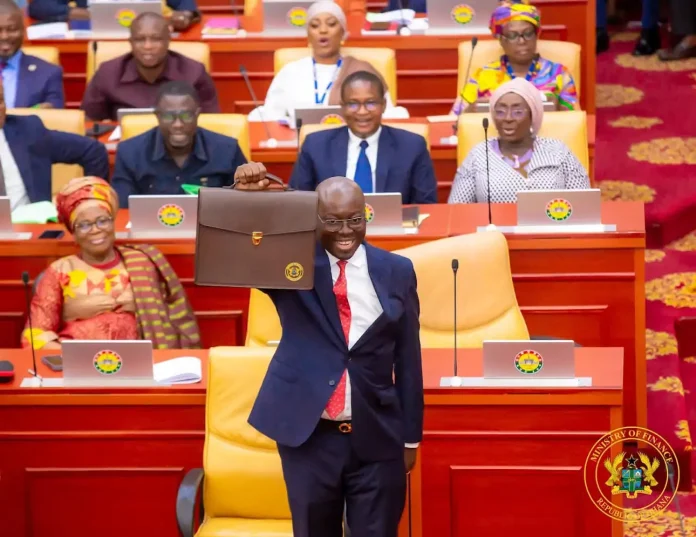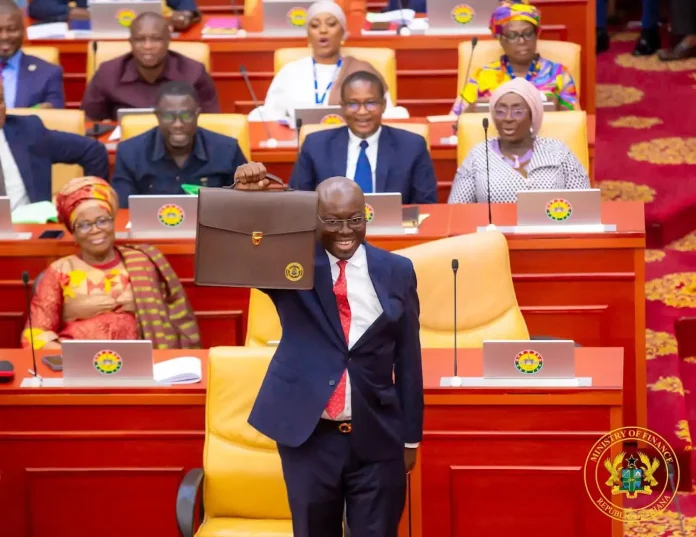
Ghana’s private sector has outlined five critical priorities for Finance Minister Dr. Cassiel Ato Forson to address in the 2026 Budget Statement and Economic Policy scheduled for presentation to Parliament on November 13, 2025.
According to findings from the KPMG and United Nations Development Programme (UNDP) 2026 Pre Budget Survey released this week, businesses across sectors acknowledge Ghana’s recent progress in achieving macroeconomic stability but emphasize the need for policies that deliver tangible improvements in the real economy.
Firms want access to affordable credit, stable energy supply, a simplified tax regime, stronger micro, small, and medium sized enterprise (MSME) support, and incentives for sustainable growth. The survey noted that stability must now translate into productivity and competitiveness, with the 2026 budget focusing on unlocking finance, improving energy reliability, and strengthening the capacity of local enterprises.
Top among the private sector’s concerns is the high cost of credit and limited access to long term financing, particularly for MSMEs. Businesses are urging the government to introduce more concessional loan schemes, expand credit guarantee programmes, and provide targeted grants to ease liquidity pressures.
Respondents also called on the government to fast track the operationalization of the Women’s Development Bank, which is expected to increase financing for female led enterprises, and to establish a Domestic Credit Rating Agency to improve transparency in lending markets.
One respondent stated that affordable finance remains the single most critical factor for business survival and expansion, noting that without low interest credit, many MSMEs cannot scale operations or create jobs.
Businesses continue to identify unreliable power supply and rising energy tariffs as key constraints on growth and competitiveness. The private sector is advocating for a stable tariff regime, more investment in renewable and off grid energy solutions, and a clear framework for energy cost recovery to avoid unexpected price adjustments.
Firms also urged greater investment in transport and digital infrastructure to reduce logistics costs and boost industrial productivity. Many expressed support for the proposed Infrastructure Credit Guarantee Institution, which aims to leverage private capital for strategic projects such as industrial parks, logistics hubs, and port upgrades.
The survey stressed that reliable power and efficient transport systems are essential for competitiveness, determining whether Ghana can attract and retain investment.
Businesses are calling for comprehensive tax reform to make the system fairer, simpler, and more predictable. They cited multiple and overlapping taxes, frequent policy changes, and unclear implementation timelines as barriers to long term planning.
Respondents proposed streamlining existing levies, eliminating outdated taxes such as the COVID 19 Levy, and publishing an annual tax calendar to guide corporate decision making. The survey also recommends targeted tax incentives for manufacturing, green industries, and SMEs to spur domestic production and job creation.
The report noted that simplifying the tax system will improve compliance, enhance revenue predictability, and reduce the cost of doing business.
Recognizing that SMEs account for the majority of employment and innovation in Ghana, the private sector is urging greater investment in technical and vocational education and training (TVET), apprenticeships, and workforce development.
Businesses also called for the creation of SME support desks in key institutions, backed by incentive schemes to promote growth oriented enterprises. They advocated stronger Made in Ghana procurement policies to strengthen local supply chains and increase domestic content participation in public projects.
The survey emphasized that SME development should be a cornerstone of Ghana’s industrial policy, noting that skills and access to local markets are the foundation for inclusive growth.
Sustainability has become central to corporate strategy, with many businesses aligning with global trends toward low carbon growth. Companies are calling for green tax credits, climate finance incentives, and public private partnerships (PPPs) to support renewable energy, waste recycling, and circular economy initiatives.
The survey suggests that green policies could become the next driver of competitiveness, helping Ghana attract environmentally conscious investors and reduce carbon intensity across industries. The report added that green finance and sustainability incentives are no longer optional but represent the future of competitiveness and resilience.
Ghana’s economy showed impressive resilience in 2025, with real gross domestic product (GDP) growing by 6.3% in the second quarter, up from 5.7% a year earlier, supported by strong gold exports and private sector credit growth. Inflation declined to 9.4% in September 2025, marking nine consecutive months of moderation, while the cedi remained relatively stable through prudent monetary management and improved external reserves.
The 2026 budget will be the first full year fiscal plan of the Mahama administration since returning to power in 2025 and represents the most significant fiscal policy presentation following nearly nine months of steering the economy through challenging global and domestic environments. Economic observers note that the 2025 Budget largely operated within the fiscal framework inherited from the previous government.
Dr. Forson has previously indicated that the 2026 Budget will prioritize job creation and economic growth, with targeted investments in sectors that drive productivity, innovation, and youth employment. The Finance Minister is expected to review several levies, including the COVID 19 levy, as part of measures to support business recovery and boost consumer confidence.
With Ghana set to exit the International Monetary Fund (IMF) programme in May 2026, the upcoming budget will be closely scrutinized for its post programme strategy. The IMF has emphasized that fiscal discipline remains the cornerstone of Ghana’s economic recovery, warning against a repeat of past fiscal slippages particularly as the government seeks to clear outstanding payables.
The pre budget survey collaboration between KPMG and UNDP engages businesses across sectors annually to assess how economic policies affect operations and gather perspectives on fiscal priorities for upcoming budgets. The objective is to provide evidence based insights that help align national policy with private sector needs and long term development goals.
In summary, the private sector’s message to government is that the 2026 Budget should consolidate macroeconomic stability by investing in the real economy, where businesses, jobs, and innovation drive sustainable growth.
